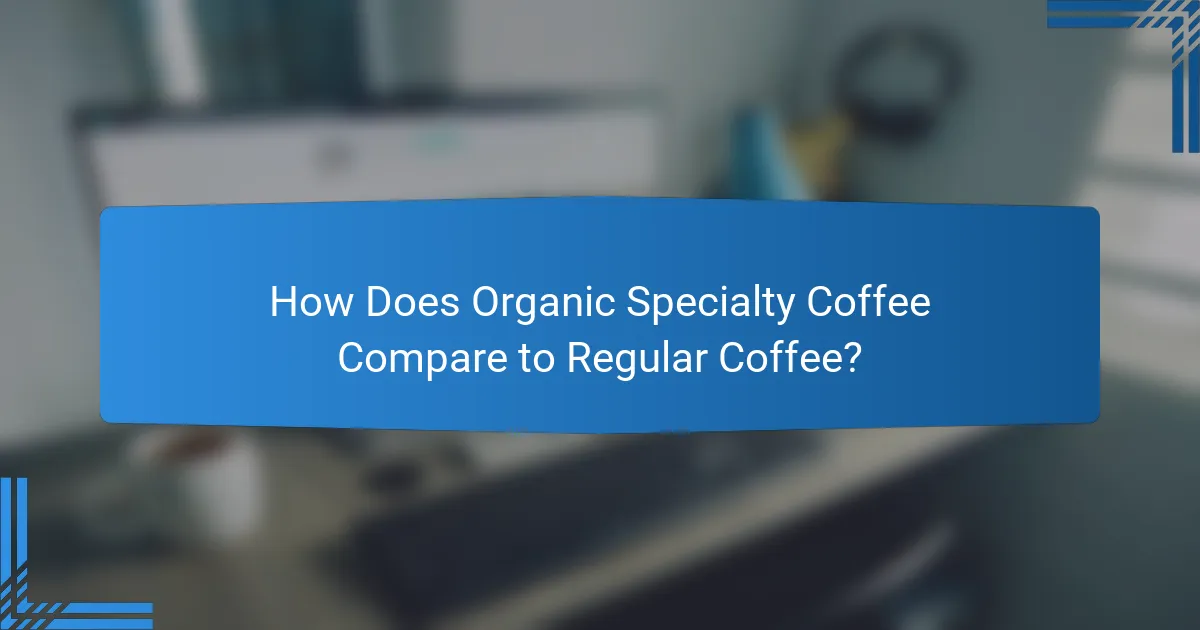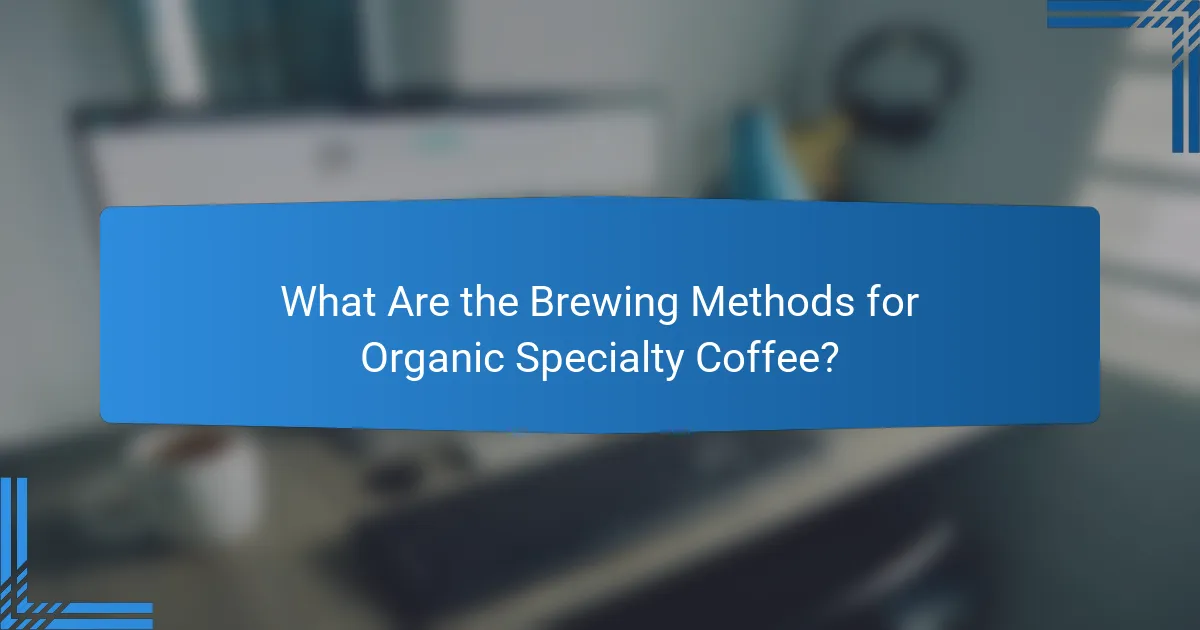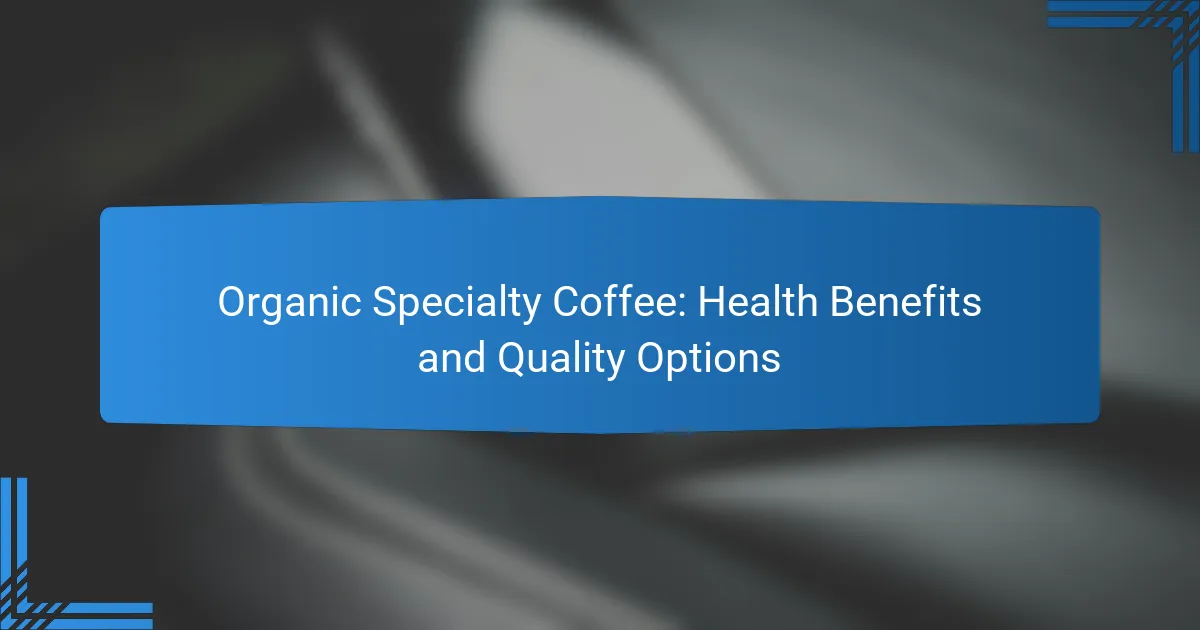Organic specialty coffee not only delivers a rich and enjoyable flavor but also offers numerous health benefits, including antioxidant properties and improved mental alertness. By choosing high-quality beans cultivated without synthetic pesticides, consumers can enjoy a cleaner, more flavorful coffee experience while supporting sustainable farming practices.

What Are the Health Benefits of Organic Specialty Coffee?
Organic specialty coffee offers several health benefits due to its high-quality beans and natural cultivation methods. These benefits include antioxidant properties, improved mental alertness, and potential disease risk reduction.
Rich in Antioxidants
Organic specialty coffee is packed with antioxidants, which help combat oxidative stress in the body. These compounds, such as chlorogenic acids, can neutralize free radicals and may contribute to overall health.
Drinking organic coffee regularly can provide a significant boost to your antioxidant intake, often surpassing that of fruits and vegetables. This makes it a valuable addition to a balanced diet.
Improves Mental Alertness
One of the most recognized benefits of organic specialty coffee is its ability to enhance mental alertness. The caffeine content stimulates the central nervous system, leading to increased focus and reduced fatigue.
Consuming a moderate amount of coffee, typically around 1-3 cups per day, can help improve cognitive functions such as memory and reaction time. However, excessive intake may lead to jitters or anxiety.
Supports Metabolism
Organic specialty coffee can support metabolism by increasing the metabolic rate, which helps the body burn calories more efficiently. Caffeine is known to enhance fat oxidation, making it a popular choice for those looking to manage weight.
Incorporating coffee into a healthy lifestyle, alongside regular exercise and a balanced diet, can aid in weight management. However, it’s essential to avoid high-calorie additives like sugar and cream.
May Reduce Risk of Certain Diseases
Research suggests that regular consumption of organic specialty coffee may lower the risk of certain diseases, including type 2 diabetes and Parkinson’s disease. The antioxidants and anti-inflammatory properties in coffee contribute to these protective effects.
While more studies are needed to establish definitive links, moderate coffee consumption is generally considered safe and may offer health benefits. It’s advisable to consult with a healthcare provider for personalized advice.
Enhances Mood
Organic specialty coffee has been linked to improved mood and emotional well-being. The caffeine in coffee can stimulate the release of neurotransmitters like dopamine and serotonin, which are associated with feelings of happiness.
Enjoying a cup of organic coffee can be a simple way to enhance your mood throughout the day. However, it’s important to consume it in moderation to avoid potential negative effects on sleep and anxiety levels.

How Does Organic Specialty Coffee Compare to Regular Coffee?
Organic specialty coffee is generally considered superior to regular coffee due to its lower chemical residues, enhanced flavor profile, and adherence to higher quality standards. These factors contribute to a healthier and more enjoyable coffee experience.
Lower Chemical Residues
Organic specialty coffee is grown without synthetic pesticides, herbicides, or fertilizers, resulting in significantly lower chemical residues compared to regular coffee. This means that when you choose organic, you reduce your exposure to potentially harmful substances.
Additionally, organic farming practices often promote healthier soil and ecosystems, which can enhance the overall quality of the coffee. Look for certifications like USDA Organic to ensure you are selecting genuinely organic options.
Better Flavor Profile
The flavor profile of organic specialty coffee is typically richer and more complex than that of regular coffee. This is due to the careful cultivation and processing methods used by organic farmers, which allow the natural flavors of the beans to shine through.
Many coffee enthusiasts appreciate the unique tasting notes that organic varieties offer, often describing them as more vibrant and nuanced. When selecting coffee, consider trying single-origin organic options to explore distinct flavors from different regions.
Higher Quality Standards
Organic specialty coffee is subject to stricter quality standards throughout its production process. This includes careful selection of beans, meticulous processing, and rigorous grading systems that ensure only the best beans make it to market.
Many organic specialty coffees are also sourced from small-scale farmers who prioritize sustainability and ethical practices. Supporting these producers not only guarantees quality but also contributes to fair trade and environmental stewardship.

What Are the Best Organic Specialty Coffee Brands?
The best organic specialty coffee brands are known for their high-quality beans, sustainable sourcing practices, and unique flavor profiles. These brands prioritize organic farming methods, ensuring that their coffee is free from synthetic pesticides and fertilizers.
Stumptown Coffee Roasters
Stumptown Coffee Roasters is renowned for its commitment to quality and direct trade practices. They source beans from small farms around the world, ensuring fair compensation for farmers while maintaining high standards for organic certification.
Their blends, such as the Hair Bender, offer a complex flavor profile with notes of chocolate and citrus. Stumptown also emphasizes freshness, often roasting beans within days of shipping to customers.
Blue Bottle Coffee
Blue Bottle Coffee is celebrated for its meticulous approach to sourcing and roasting. They focus on single-origin coffees, which are often organic, allowing customers to experience distinct flavors from different regions.
With a commitment to sustainability, Blue Bottle partners with farmers who practice organic farming. Their subscription service offers a convenient way to enjoy freshly roasted coffee delivered to your door, ensuring you always have quality coffee on hand.
Counter Culture Coffee
Counter Culture Coffee is dedicated to environmental sustainability and social responsibility. They offer a wide range of organic coffees, each with unique tasting notes that reflect their origin.
This brand is known for its transparency in sourcing, providing detailed information about the farms and the farmers behind each coffee. Their educational resources help consumers understand the importance of organic practices in coffee production.

How to Choose Quality Organic Specialty Coffee?
Choosing quality organic specialty coffee involves assessing several key factors, including certifications, roast date, and the coffee’s origin and variety. These elements can significantly impact both the flavor profile and health benefits of the coffee you select.
Look for Certifications
Certifications ensure that the coffee meets specific organic standards and ethical practices. Look for labels such as USDA Organic, Fair Trade, or Rainforest Alliance, which indicate that the coffee is grown without synthetic pesticides and supports sustainable farming practices.
When evaluating certifications, consider the credibility of the certifying body. Reputable certifications often come with strict guidelines that enhance the quality and environmental impact of the coffee.
Check Roast Date
The roast date is crucial for determining the freshness of your coffee. Ideally, you should consume coffee within two to four weeks of its roast date for optimal flavor and aroma. Freshly roasted coffee retains its essential oils and flavors much better than older beans.
When purchasing, look for bags that clearly display the roast date. Avoid coffee that does not have a roast date or is older than a month, as it may lack the vibrant taste associated with high-quality specialty coffee.
Consider Origin and Variety
The origin and variety of coffee beans significantly influence their flavor profile. Different regions produce beans with unique characteristics; for example, Ethiopian coffees are often fruity and floral, while Colombian coffees tend to be more balanced and nutty.
Researching the specific variety can also enhance your selection. Arabica beans are generally considered superior in flavor compared to Robusta, which can be more bitter. Look for single-origin coffees to experience the distinct qualities of beans from a specific region.

What Are the Brewing Methods for Organic Specialty Coffee?
Organic specialty coffee can be brewed using various methods, each offering unique flavors and characteristics. The choice of brewing technique impacts the extraction process, resulting in different taste profiles and experiences.
Pour Over
Pour over brewing involves manually pouring hot water over coffee grounds in a filter. This method allows for precise control over water temperature and flow rate, which can enhance flavor extraction. Popular pour over devices include the Hario V60 and Chemex.
To achieve optimal results, use a coffee-to-water ratio of about 1:15 to 1:17. This means for every gram of coffee, use 15 to 17 grams of water. Experimenting with grind size and pouring technique can yield different flavor notes.
French Press
The French press, or press pot, brews coffee by steeping coarse grounds in hot water before pressing down a plunger to separate the grounds. This method produces a rich and full-bodied cup due to the coffee oils remaining in the brew.
For a balanced flavor, a common ratio is 1:12, meaning 1 part coffee to 12 parts water. Steep for about 4 minutes before pressing. Avoid over-extraction by not steeping longer than necessary, which can lead to bitterness.
Espresso
Espresso is a concentrated coffee brewed by forcing hot water through finely-ground coffee under high pressure. This method creates a rich, intense flavor and a creamy texture, making it the base for many coffee drinks like lattes and cappuccinos.
For a standard shot, use about 18 to 20 grams of coffee and extract for 25 to 30 seconds. Ensure your espresso machine is properly calibrated for temperature and pressure to achieve the best results. Regular cleaning of the machine is essential to maintain flavor integrity.
